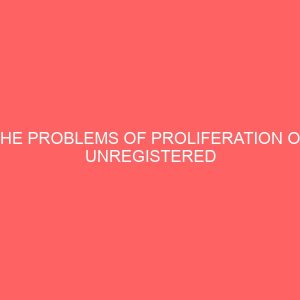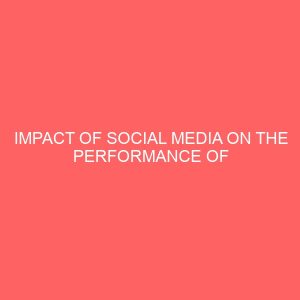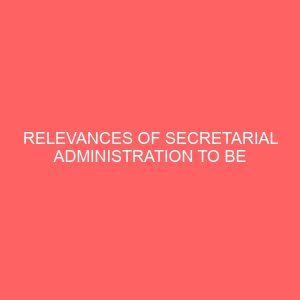Description
CHAPTER ONE
1.2 Background Of The Study
For a very long time in the history of this University, staff welfare problems have not been given adequate attention by the management. In the early 70s, the employees of this University did not bother the administration much about their welfare as the attention of all and sundry was on reconstruction and rehabilitation of the infrastructural facilities destroyed during the civil war. Moreover, the only staff Union strongly in operation on the campus by then was the Non-Academic Staff Union (NASU). The workers were not properly conscious of their rights to some statutory welfare programmes. There was no categorization of staff Unions to fight for their respective categories of workers as it is today.
In the 80s, the Non-Academic Staff Union (NASU) faced the administration squarely for any of the rights of the workers that was not met. Within the period, the Bursar would always run out of the office for his dear life whenever NASU came up with her angry members demanding one welfare programme or the other. In the early 80s, the Acting Bursar?s car was raised up by an angry mop and turned upside down with some virgin palm leaves tied on the car. That was in protest against non-payment of salaries and allowances as and when due by the then acting Bursar.
By then, the Bursar was always held responsible for any lapses on staff welfare as he was in practice, the financial controller in the institution. Later in 80s, other
Unions saw that NASU alone could not fight for them and started going into agreement with the Federal Government of Nigeria on the welfare of their respective members. These Unions became highly aggrieved by the non-payment of some allowances approved for them by the government in 1991. However, Udeala (1993: 5-8) in his report to the newly elected University Council at its inaugural meeting on December 16, reported as follows:
?The administration has, during the year, paid all the allowances stipulated in the agreement between the government and various Unions in the University. The meal subsidy will be paid when NUC make funds available?
Discussing the state of staff residential houses on the campus in the report, he explained that:
Over the years, staff houses have suffered neglect because of lack of fund. Some of the houses are in such a state that are not befitting for any staff.
On fund problems, he had this to day:
For quite a long time, no financial allocation for purchase of drugs was made to the University Medical Centre. The conditions of services in the University include free medical treatment. The economic situation in the country and the astronomical increase in prices of drugs have made this policy unrealizable.
The same questions would go to the University administration about housing loan because the loan was only once granted to a few staff that had not more than three years to retire from serve. This was the situation before the arrival of the Sole Administrator in 1995. That was why in his address at the4 meeting of the
Administration and the Executive Secretary of the National Universities Commission
(NUC) Gomwalk (1997: 5-6) discussed staff problems and their implications on the performance of such staff saying that:
Staff development is not being pursued with the desired vigour due to lack of funds. For staff on seat, moral is low because of the lack of facilities for teaching and research ? Many staff have not the opportunity to attend academic conferences or get sponsored research. Staff development has considerably slowed down ?
All these problems lead to staff disenchantment and frustration. The result of all these problems was crisis everywhere on the campus. This moved Gomwalk (1997, 3) to comment thus:
The University of Nigeria is not only the oldest indigenous University in the country, it is also one of the largest and one of those expected to hold on the greatest hope for the country. In recent years, however, it has become the most crises ridden and seems to remain the most crises prone.
After making the above comments, Gomwalk regretted the suffering of workers as some stagnated for between 5 and 15 years of active service on their positions without promotions. The diminutive status of many of the employees of the University pushed his administration to approve double promotions to the stagnating staff that merited it. He did that to motivate such staff towards improved productivity.
Faced with the problems of fund which he described as the root of the incessant crises in the University, the Vice Chancellor prepared a 14 paged position paper to the Federal Government on the special needs of the University. In them paper, Mbanefoh (2000:14) made it pointedly clear that:
Poor funding is at the root of incessant crisis in the University. The abundant human resources in the University need the motivation which a special funding will promote. A situation where recurrent grant from the government hardly pays salaries and allowances let alone leave something for goods and services is a recipe for crisis.
One is really not certain from the above, which is to blame about the inability of the University administration to meet even the statutory welfare of her employees talk less of initiating some highly motivating welfare programmes.
Should we blame the Administration, the Government or who? This is why the researcher embarks on this study.
1.2 Statement of the Problem:
Ajileye (1992: 154) highlighted the importance of the welfare of employees when he wrote that:
Since, irrespective of its capital and knowledge, an organization depends for its success on its human resources, the more satisfied the employees? needs, the more willing the employees are to put in efforts that get the job done? good welfare services are capable of attracting and retaining the right caliber or employees for an organization?s operations.
The careers of the employees are at the mercy of the management. They live in fear of job insecurity because instead the administration will carry out a research on the type of welfare programmes they can fund; they specialize in threatening to retrench the workers whenever they demand very seriously the statutory welfare which they see as a right and not privilege. Yet the same management looks on these employees to generate the type of human resources that will lead the nation to greatness educationally, economically, culturally, technologically and politically. This is why the few major staff Unions on the campus is usually on industrial dispute with the management at one time or the other. At times, their strike action will last far more than four weeks and hardly does any session pass without twice or more such strike actions.
Based on the above stance of the management of the University, we now pose the following questions:
1. Why has the University management been unable to appreciate the need for workable welfare programme for the employees?
2. To what extent is fund problem responsible for non-availability of appreciable welfare schemes for the University Of Ibadan?
3. Are there possible solutions to the problems of employees? welfare programme in the University Of Ibadan?
1.3 Purpose Of The Study
This study tends to:
1. To give an empirical analysis of what actually motivate workers to performance in their duties.
2. To examine the relationship between staff welfare and organizational productivity.
3. To examine how staff welfare affect staff?s emotion at workplace.
4. To examine the impact of staff welfare on both the staff and the organization herself.
5. To find out whether good staff welfare package is the best form of motivating staff to perform.
1.4 Objectives Of The Study
The study primarily examines the effect of staff welfare on job performance in organizations particularly in University of Ibadan.
The study is therefore limited to the issue of staff welfare and how it increases job performance and how it impacts the organization at large. The study area in which data were gathered is University of Ibadan.
1.5 Research Question
1. Is the welfare scheme adequate enough for workers in your organization?
2. Is the level of employees? motivation as a result of staff welfare scheme high?
3. Has this scheme any relationship with staff performance?
4. Has this scheme any relationship with employees? motivation in University of Ibadan
1.6 Scope of the Study
This research work focuses particularly on the good office management and staff welfare and organizational productivity using University of Ibadan as a case study.
1.7 Limitations of the Study:
Some of the responses from our respondents are subjective and this places great limitation to this study. Hence, the human element in investigative situations like the responses from these respondents cannot be completely avoided. Closely related to the above is the disposition of some high level management staff and heads of departments and units whom we interviewed. There is the possibility that, in a bid to protect their positions and their units, they keep away vital information from us. Such official dispositions are not unusual in a country like ours where selfless service is seen as an abomination and corruption conversely is a norm.
Additionally, some of our respondents are not sufficiently literate to work on our questionnaire without help. The presences of the researcher or whoever interpreted the questions and the possible responses for them may have in one way or the other affected their responses.
Moreover, the study is supposed to cover all the management staff and all the employees of all categories numbering. The fact that we randomly selected our respondents places some limitations on this study.
1.8 Definition Of Terms
Some the terms used in this research study may not be represented in the literature or universal meanings it is therefore imperative to explain the contextual meaning of some of the words used to guard against ambiguity but pare way for conciseness. Meanwhile, the terms are professional in nature.
MOTIVATION
Motivation is a factor which make an employee to participate to action, it is referred to as those factors which arose employee to action and could be measured by identifying various needs of the individuals workers and how such needs influences the behavior of the workers in the work situation in an organization.
SATISFACTION
This is employee?s contentment about his satisfaction; it could be defined subjectively as the job reward which employee derives from the work situation done effectively. Satisfaction could be measured in terms of difference between what the employee expects from the service he or she referred to the organization and what he or she actually derives.
INCENTIVES
These are inducements given to an employee of an organization for the purpose of carrying out organizational objectives. It could be measured by the amount of inducement which workers get from the organization and the extent to which such inducement enhances their performances.
MANAGEMENT
Doing things using the instrument ties of other people. It is also the process combining and utilizing or allocating organizational resource by planning, organization directing, and controlling for the purpose of achieving organization objectives.
DECISION MAKING
This is the process whereby solutions are pointed to the problem in the organizations, decision making is concerned with the formulation of policies guiding or governing the running of an organization.
EMPLOYEE WELFARE SCHEME
In this study employees welfare scheme is also variously known as the employees welfare services. Employee scheme, the fringe benefits, which the employee receives from the organization besides his pay or salary.
1.9 Historical Background of U.I
Established 68 years ago, the University of Ibadan, UI as it is fondly referred to, is the first University in Nigeria. Until 1962 when it became a full-fledged independent University, it was a College of the University of London in a special relationship scheme. The University, which took off with academic programmes in Arts, Science and Medicine, is now a comprehensive citadel of learning with academic programmes in thirteen Faculties namely, Arts, Science, Basic Medical Sciences, Clinical Sciences, Agriculture and Forestry, the Social Sciences, Education, Veterinary Medicine, Pharmacy, Technology, Law, Public Health and Dentistry. The Faculties of the Basic Medical Sciences, Clinical Sciences, Public Health and Dentistry are organized as a College of Medicine. The University has other academic units among which are: Institute of Child Health, Institute of Education, Institute of African Studies, Centre for Child Adolescent and Mental Health, etc.
Today, the University is consistently ranked among the prestigious Universities in the world. Through its alumni and alumnae, the University of Ibadan has, in the past six decades contributed significantly to the political, industrial, economic and cultural development of Nigeria.
These graduates, staff and students are making great impact on the world through their new discoveries, innovations and inventions in science, medicine, agriculture, business and technology. No doubt, the University?s commitment to academic excellence enables them to fly high.
UI looks forward to an exciting future!







